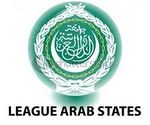League of Arab States
 | |
| Type: | Organization |
| Industry: | Government & Politics |
| Founded: | March 22, 1945 |
| Headquarters: | Cairo |
| Country: | Egypt |
| Website: | arableagueonline.org |
| Key People | |
| Dr. Nabil El Araby, Secretary General | |
The League of Arab States is an organization composed of 22 member states in the Arab Region (North and Northeast Africa and Southwest Asia or Middle East). Its main objective is to strengthen the relationship of its member states, co-ordinate their economic, political, cultural, health and social welfare, communications and other activities and to protect their independence, sovereignty and the general affairs and interest of Arab countries. The original members of the League of Arab States include Saudi Arabia, Iraq, Egypt, Yemen, Lebanon, Transjordan (Jordan) and Syria. The current Secretary General of the league is Dr. Nabil El Araby. [1] [2]
History edit
The organization was formally established when the Kings of the original member states signed the Arab League Pact on March 22, 1945. Under the pact, the governance of the League of Arab States is executed by a Council, which is comprised of one representative per member state. The Council is mandated to supervise the implementation of agreements made by member states and to determine if it is necessary for the league to participate in international organizations to maintain peace and security as well as economic and social relations in the Arab region. Special Committees prepare draft agreements on specific areas of co-operation between the member states to realize the objectives of the League on different issues. Its Secretary General is appointed by the Council whose rank is equal to an Ambassador. [3]
The members of the League of Arab States signed the Cultural Treaty in 1946, followed by the Joint Defence and Economic Cooperation Treaty in 1950. They established the Economic and Social Council in 1953 and in 1958, the organization was recognized by the United Nations and became its representative organization in the Arab region to promote culture, education and science. The league conducted its first summit in Cairo in 1976 and authorized the deployment of Arab Peacekeeping Force in Lebanon. In 1987, the league supported Iraq's defense in support of its legal rights against its dispute with Iran and condemns Iran for its delayed acceptance to the ceasefire proposed by the United Nations. In 1990, the organization criticized the Western's actions in preventing Iraq from developing advance weapons technology. During the same year, 12 member states of the league disapproved Iraq's invasion in Kuwait. In 1996, the Arab League Council resolved that Iraq, Syria and Turkey must share the waters of Euphrates and Tigris rivers. In 2004, the league conducted an emergency discussion regarding the crisis in Darfur, Sudan and opposed sanctions and international military intervention. In 2008, the ministers of the league condemned the decision of International Criminal Court (ICC) to arrest of Sudanese President Omar al-Bashir for charges of war crimes and genocide in Darfur. In 2011, the league supported the UN resolution to attack the air defenses of Libya. During the same year Egyptian diplomat Nabil Al-Arabi was elected Secretary General of the Council and Syria's membership to the organization was suspended after failing to implement the agreement to stop its military action and to negotiate with the opposition. [4]
Member States edit
- Algeria - joined 1962
- Bahrain - joined 1993
- Comoros - joined 1977
- Djibouti - joined 1945
- Egypt - joined 1945
- Iraq -joined 1961
- Jordan - joined 1945
- Kuwait - joined 1961
- Lebanon - joined 1945
- Libya - joined 1953
- Mauritania - joined 1973
- Morocco - joined 1958
- Oman - joined 1971
- State of Palestine - joined 1976
- Qatar - joined 1971
- Saudi Arabia - joined 1945
- Somalia - joined 1974
- Sudan - joined 1956
- Syria - joined 1945 (suspended on November 16, 2011)
- Tunisia - joined 1958
- United Arab Emirates - joined 1971
- Yemen - joined 1945
Sectors edit
The different sectors of the organization include:[5]
- Secretary General Cabinet
- Political Sector
- Economical Sector
- National Security Sector'
- Auditing Sector
- Social Affairs Sector
- Palestine Sector
- Media and Communications Sector
- Human Resources Sector
Application for .arab and .عرب TLDs edit
During the 30th meeting of the Arab League Permanent Committee for Telecommunications and Information in Abu Dhabi on January 8-9, 2012, H.E. Mohamed Nasser Al Ghanim, UAE Telecommunications Regulatory Authority (TRA) Director General announced the agency's application for the .arab and .عرب TLDs with ICANN.[6] The TRA's initiative is supported by the International Telecommunications Union (ITU) and offered assistance in the application process and to act as "temporary operational entity" in case the league needs more time in establishing an effective and efficient TLD management team. [7]
References edit
- ↑ League of Arab States
- ↑ Pact of the League of Arab States, March 22, 1945
- ↑ Pact of the League of Arab States, March 22, 1945
- ↑ BBC News Timeline: Arab League
- ↑ About LAS Sectors
- ↑ The TRA Hosted the Arab League Permanent Committee for Telecommunications and Information Meeting in Abu Dhabi
- ↑ ITU support for The Creation of “.ARAB” Internet Top Level Domain
